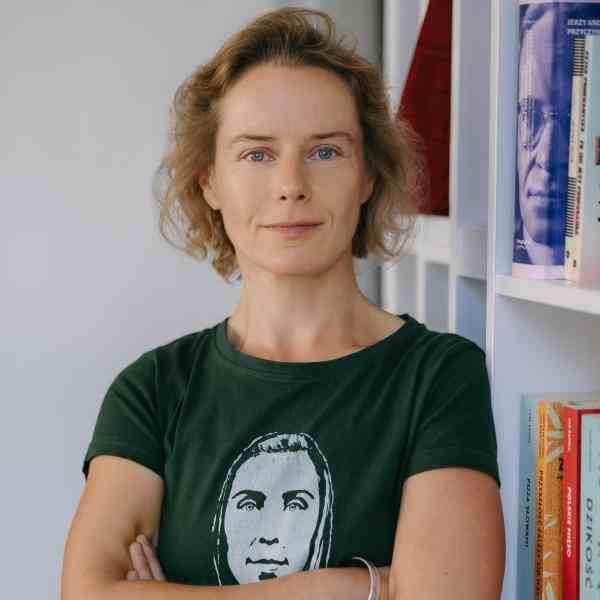Introduction
To counteract violence against women and build solidarity among women with different backgrounds, Agata has created a primary prevention system that, through Strength – Courage – Autonomy – Solidarity, enables girls and women to create communities where they are free of violence and discrimination.
The New Idea
Agata understands that the root causes of violence against women come from early experiences of growing up amid current gender socialization and stereotypes. From the very beginning of her work, she was aware that she couldn’t address this widespread and complex problem alone since it manifests differently in various communities.
The backbone of the movement, the “network of networks,” is Sisters’ Street, which Agata launched in 2002. Today that includes three networks initiated by Agata, each of which encompasses a wide spectrum of free-standing initiatives, including feminist funds, advocacy bodies, trainers’ centers, and hundreds of new grassroots initiatives being created by the networks’ members every year.
How to utilize the fundamental organizing principles for Sisters’ Street, Strength – Courage – Autonomy – Solidarity, are described in a regularly curated manual and yearly updated repository for women and girls seeking to launch new initiatives, whether it is their first or just the latest change they seek to make. Sisters’ Street is seen by its many individual and group members variously as: a home, a school, a marketplace, and a place for reflection for female leaders. It all sums up the primary violence prevention system that Agata continually develops.
Agata’s movement launched in Poland and its networks now extend to Belarus, the Ukraine and Lithuania. One of its most recent initiatives, Girls Empowerment Centers, is poised for wide-scale replication in Western Europe.
The Problem
Prior to the early 2000s, there were no official statistics for violence against women in Poland and Ukraine apart from domestic violence figures, but what statistics did exist painted a dire picture. According to official police statistics in 2005, over 91,000 Polish women suffered from domestic abuse, and from 1999 to 2006, the numbers were only rising. The Institute of Sociological Studies under the Ukrainian National Academy of Science estimated in 2001 that 68% of women in Ukraine were victims of domestic abuse and 25% of these women are beaten "as a rule" or "often".
With the transition to capitalism (in 1989), women experienced a backlash to social advancements supported by the communist system. The communist system had ensured women a minimum of job security, childcare, and health care; these were withdrawn by succeeding post-communist governments. The transition to capitalism in Poland led to the infamous “double burden” in which women were exhausted by balancing both the demands of domestic work and a career. Comparative research on the post-transition period cited a sizeable gap between the number and membership of feminist organizations and activities in Poland as compared to Western European countries and attributed some of this gap to a concerted effort to return to “traditional” gender roles.
Agata’s movement and the networks supporting it continue to face challenges from right-wing generated efforts to curtail women’s rights. For example, in 2021 the Polish government decided to withdraw from the Convention on Preventing and Combating Violence against Women and Domestic Violence, better known as the Istanbul Convention. The Polish government criticized the treaty for stating that "culture, custom, religion, tradition or so-called 'honor' shall not be regarded as justification" for acts of violence against women.
The Strategy
Agata began creating the first element of this primary violence prevention system in the 1990s. She was the first WenDo trainer in Poland, an empowerment and self-defense discipline that is proven to work on building self-confidence, self-defense, and assertiveness. She created her first “network” focusing on women’s self-defense. Currently the WenDo Academy trains cohorts of trainers to work across Poland, but also in Belarus, Ukraine, and Lithuania. Agata widened the concept of who could profit from WenDo training by including girls and women with physical disabilities, as well as Roma girls and women and other overlooked minorities, not only as participants of the trainings, but also as trainers. Her WenDo Academy network continues to equip next generation female leaders across Eastern Europe, and in 2021 WenDo Academy began working with a partner organization from Iceland to train the first WenDo trainers on that island.
What the early years of WenDo network building confirmed for Agata was the sheer diversity of feminism, and that she needed to create an over-arching home for networks like WenDo, each of which would grow into its own identity, but also collaborate with other efforts to empower women. That was the genesis for Sisters’ Street, which she launched informally in the mid-1990s and incorporated in 2002.
Following this principle Agata has built a whole generation – literally hundreds of women – of community leaders. The participants who were part of Sisters’ Street activities as children are already active grown-up citizens and it’s now a sustainable, self-financed, and deeply diverse community, operating since 2002. Community members have created solutions in various areas such as sexual education for girls on the autism spectrum, empowering Roma communities, co-housing, and regenerative spaces for queer activists, and promoting zero waste through repair cafes (meetings in which people repair for household devices, bikes, etc.). Women leaders empowered through Agata’s activities made a transformative journey of finding their strength and courage to drive more than 300 solidarity-based initiatives in Poland, Czech Republic, Belarus, Ukraine, France, and Germany.
People began to see that there were answers for the problems that they faced, thanks to Sister’s Street’s “public record.” If, for example, you were a woman who didn't know how to defend yourself, Agata and WenDo Academy provided widespread access to the proven self-defense and assertiveness technique. If you identified as a feminist but felt lonely and disconnected, Sisters’ Street gave you support and empowered you to support others. Perhaps as a Roma woman, you didn’t associate yourself with the mainstream identity of a ‘feminist’ – until you found that there was a Roma member of the Sister’s Street network who shares your experiences and supports women as you wanted to be supported. If you were trans, neurodiverse, or in a wheelchair, there were those who shared your experience and actively empowered people like you. If you were a student, anti-discrimination education was provided at your school, thanks to the Anti-discrimination Education Society, in cooperation with local governments. That showcase of solutions backed by media coverage supports mindset shift where empowered, diverse women express their solidarity in practice.
The vast experience of Sisters’ Street members allows Agata to gather knowledge and run research to constantly observe different struggles experienced by women representing different groups. Based on those observations, Agata and her team decide which challenges they should address and in what form – stable, resource-generating institutions, policies, or changes in key curricula.
In 2009 Agata created her second network with a defined social purpose, the Anti-discrimination Education Society (ADES). It trains teachers in practicing anti-discrimination. ADES works with all levels of the schooling system from primary to tertiary. Working closely with teacher training universities and with the broad support of local governments, Agata created The Anti-discrimination Standards for Universities – a set of guidelines supported by the Conference of Rectors of Academic Schools in Poland. For example, Agata’s efforts led to the introduction of the anti-discrimination provisions in the bylaws of the Pedagogical University of Krakow. It also established a new role there – the Rector's Plenipotentiary for Equal Treatment. The University, which produces Poland’s future teachers, became the first higher education institution in Poland that is mindful of its trans students and is adapting all its systems to reflect their specific needs.
In 2018, Agata created the third element of her primary violence prevention network, Girls Empowerment Centers, to focus on making improvements in the way local communities support girls’ growing up, by strengthening their commitment to girls and young women as changemakers in their communities, free of gender stereotypes that preclude girls and young women from leading change in their communities. The Center activities range from creating start- ups (e.g., creating bike repair businesses) to collecting family “herstories,” drawing from both their own experiences and from interviewing their grandparents and other relatives, and doing research on their communities.
As of 2021 there are eight Girls Empowerment Centers across Poland, located in cities and rural towns. Informed by data from these pilots, Sisters’ Street has now created a core group of 20 leaders committed to widely replicating these Centers in Polish cities and towns, and to launch pilot centers in Belarus. Agata is now working with NGO partners in Germany and Belgium who seek to replicate her vision of a network of Girls Empowerment Centers. She is also collaborating with NGO leaders to create EU legislation calling for a Girls Empowerment Center initiative to be included in the EU Strategy on the Rights of the Child.
The Person
Agata’s father, a survivor of the Second World War of German-Jewish origins, was a musician, upholding his family’s long-established tradition. As a young girl Agata wanted to become a ballerina, but a leg injury cut her ballet career short.
During her elementary school years in then-communist Poland, she founded a Human Rights’ Club at her school. Its primary focus was on students’ rights, such as the right to fair treatment in schools. The beginning of the 1990s brought a re-awakening of feminist movements in Poland. With the encouragement of her mother, Agata became a volunteer at a hostel for domestic violence survivors. Through this experience, Agata had a unique opportunity to see the strengths and weaknesses of tertiary prevention and arrived at the conclusion that the flow of women experiencing violence would not stop by itself. Women, who make up half of society, needed to be empowered to end it for themselves and society at large.
It was during her university years in Warsaw that Agata launched WenDo Academy, which led her to come up with the initial idea of Sisters’ Street, which began as an initial informal summer gathering. By 2002, it had evolved into the ‘network of networks’ for the feminist resurgence that was underway. The annual summer gatherings continue and gather together the many female leaders whose initiatives trace their roots/herstories to Sisters’ Street.




